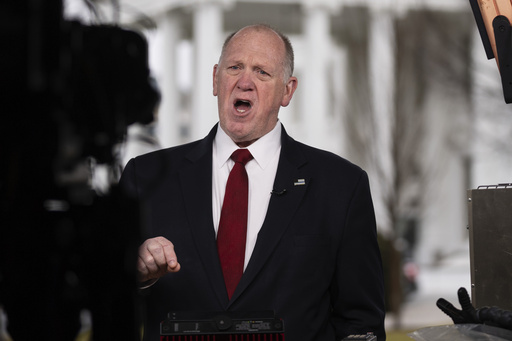ROME — In a significant statement on Tuesday, Pope Francis criticized the Trump administration’s aggressive policies for the mass deportation of migrants, asserting that forcibly removing individuals from their homes solely based on their undocumented status strips them of their intrinsic dignity and is destined to lead to negative outcomes.
The pontiff’s comments were directed towards U.S. bishops in a letter that seemingly challenged Vice President JD Vance’s recent defense of the deportation strategy on ethical and theological grounds.
Tom Homan, the U.S. immigration enforcement chief, quickly countered, remarking that the Vatican, being a city-state enclosed by walls, should leave border security matters to relevant authorities.
As the first pope from Latin America, Francis has made the advocacy for migrants a key focus throughout his papacy, frequently referring to the biblical mandate to “welcome the stranger.” He insists that nations must commit to welcoming those fleeing wars, extreme poverty, persecution, and environmental disasters, all within the means of their capacity.
The pope’s relationship with former President Donald Trump has been characterized by conflict, particularly regarding migration issues. In a notable exchange in 2016, when Trump was running for office, Francis asserted that anyone who supported building walls to exclude migrants was “not a Christian.”
In his letter, Pope Francis acknowledged that countries have an obligation to safeguard their communities from criminal activity. However, he expressed that deporting individuals, many of whom have fled from dire situations like poverty and violence, undermines their dignity and places them in a vulnerable position.
Referring to biblical texts such as the Book of Exodus and the experiences of Jesus, he emphasized the right of individuals to find refuge and security in foreign lands and categorized the deportation initiatives as a “major crisis” in the United States.
The pope argued that anyone who is educated in Christian principles would find it imperative to critically assess and oppose measures that label undocumented migrants as criminals merely due to their status. He cautioned, “What is built on the basis of force, and not on the truth about the equal dignity of every human being, begins badly and will end badly.”
Archbishop Timothy Broglio, the president of the U.S. Conference of Catholic Bishops, expressed gratitude in a letter to the pope, sharing a joint prayer for the U.S. government to fulfill its obligations towards those in need. He sought continued prayers for the nation to foster a more humane immigration system that balances community safety with the respect for human dignity.
The White House had previously announced a staggering number of over 8,000 arrests related to immigration enforcement actions since Trump assumed office. Some detained individuals have faced deportation, while others are currently held in federal facilities or even at Guantanamo Bay Naval Base in Cuba.
Defending the administration’s stringent immigration policies, Vance, who has converted to Catholicism, cited a medieval theological principle known as “ordo amoris.” He suggested this concept fosters a hierarchy in love and care, prioritizing family, neighbors, and fellow citizens above those outside the nation.
Pope Francis seemingly corrected Vance’s interpretation in his letter, stating that “Christian love is not a concentric expansion of interests.” He pointed to the example of the ‘Good Samaritan’ as one that advocates for a love that fosters fraternity inclusively, without exceptions.
David Gibson, director of the center for religion and culture at Fordham University, remarked on social media that the pope’s letter addresses every questionable theological assertion made by Vance and his supporters within conservative Catholic circles.
Vance’s argument gained traction among right-wing factions of American Catholicism, including support from organizations like the Catholic League, which endorsed his hierarchical interpretation.
Eric Sammons, editor of Crisis Magazine, defended Vance’s stance by referencing the teachings of St. Augustine and St. Thomas Aquinas, noting that all forms of love should be aligned in a specific order.
Homan, who also identifies as Catholic, stated that the pope should focus on improving the Catholic Church’s issues rather than interjecting into U.S. border policies.
“The pope wants to challenge us for securing our borders while he has a wall protecting the Vatican,” Homan remarked to reporters.
The Vatican has adopted stricter measures against illegal entry into its territory, recently enforcing a law that imposes penalties of up to four years in prison and substantial fines for individuals who unlawfully enter with malintent.
The U.S. bishops’ conference has previously voiced concerns regarding the administration’s stance on immigrants, condemning approaches that could harm the most vulnerable populations—refugees and immigrants alike.
Bishop Mark Seitz of El Paso, who leads the migration committee for the U.S. bishops, highlighted that the pope’s words offer valuable support amid the threats faced by immigrants and those aiding them. He emphasized the need to acknowledge the concerns of individuals apprehensive about immigration, including Catholic supporters of Trump, while asserting the truth in line with church teachings and real-world situations.



